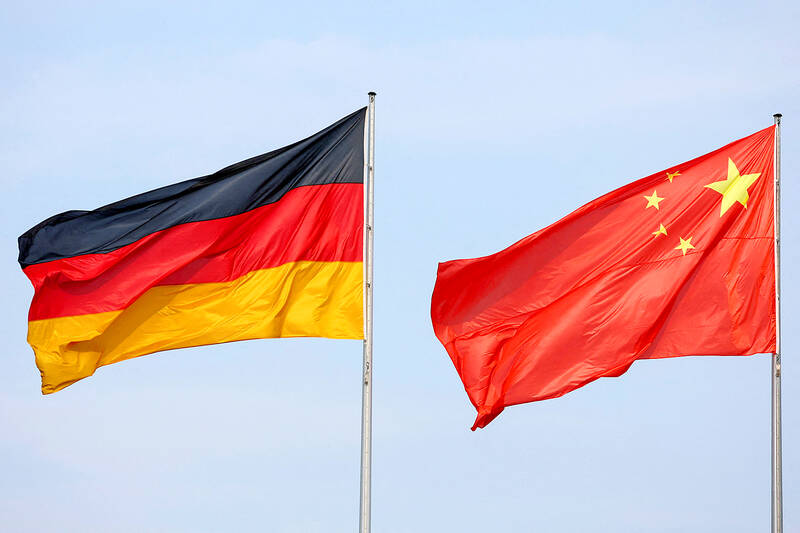Falling prices and weak demand are the main difficulties facing German companies in China, the German Chamber of Commerce said in a report yesterday, adding that European tariffs on Chinese electric vehicles (EVs) are counterproductive.
China is one of Germany’s top trading partners, accounting for a significant portion of its sales in the past few years.
However, 61 percent of 186 German companies surveyed by the business body said that “pressure on prices” is by far the biggest problem they face in China.

Photo: Reuters
Weak demand linked to the slowdown in the world’s second-largest economy and geopolitical tensions also ranked among the top concerns, the report showed.
Automakers made up 21 percent of companies surveyed.
China is the world’s largest auto market and the most advanced in terms of EV production. Dozens of Chinese EV brands have been established in recent years, supported by state subsidies.
However, China’s economic slowdown, which is weighing on consumer spending, has led to a price war between manufacturers, impacting profits. Foreign manufacturers, which have struggled to adapt to the rapid expansion of China’s EV fleet, are now also competing against Chinese vehicles on home turf.
Price pressure “is of course a result of overcapacity, but our companies are quite aligned on that — that they only can survive those times if they become more competitive,” German Chamber of Commerce executive director Maximilian Butek said at a presentation on Friday.
The EU and China are locked in a row over planned new tariffs of up to 38 percent on imports of Chinese EVs. The European Commission, which launched a probe last year into Chinese EV subsidies, has accused Beijing of unfair practices undercutting Europe’s automakers.
Germany has previously expressed concerns about applying higher tariffs, fearing reprisals for its auto giants, such as Volkswagen AG, Mercedes-Benz AG and BMW AG, which are heavily invested in China.
“Tariffs as suggested now by the EU will not increase the competitiveness of the automotive industry,” Butek said.
“Therefore, we [would] rather advocate for investing into the competitiveness of the European Union, rather than trying to protect the auto industry,” he said, adding that German makers are “dependent” on the Chinese market.
German Minister for Economic Affairs and Climate Action Robert Habeck is to visit China this week for talks on economic ties between the two countries, with his spokesperson saying that the minister “will not be able to avoid addressing” the issue of EU tariffs.

To many, Tatu City on the outskirts of Nairobi looks like a success. The first city entirely built by a private company to be operational in east Africa, with about 25,000 people living and working there, it accounts for about two-thirds of all foreign investment in Kenya. Its low-tax status has attracted more than 100 businesses including Heineken, coffee brand Dormans, and the biggest call-center and cold-chain transport firms in the region. However, to some local politicians, Tatu City has looked more like a target for extortion. A parade of governors have demanded land worth millions of dollars in exchange

Hong Kong authorities ramped up sales of the local dollar as the greenback’s slide threatened the foreign-exchange peg. The Hong Kong Monetary Authority (HKMA) sold a record HK$60.5 billion (US$7.8 billion) of the city’s currency, according to an alert sent on its Bloomberg page yesterday in Asia, after it tested the upper end of its trading band. That added to the HK$56.1 billion of sales versus the greenback since Friday. The rapid intervention signals efforts from the city’s authorities to limit the local currency’s moves within its HK$7.75 to HK$7.85 per US dollar trading band. Heavy sales of the local dollar by

Taiwan Semiconductor Manufacturing Co’s (TSMC, 台積電) revenue jumped 48 percent last month, underscoring how electronics firms scrambled to acquire essential components before global tariffs took effect. The main chipmaker for Apple Inc and Nvidia Corp reported monthly sales of NT$349.6 billion (US$11.6 billion). That compares with the average analysts’ estimate for a 38 percent rise in second-quarter revenue. US President Donald Trump’s trade war is prompting economists to retool GDP forecasts worldwide, casting doubt over the outlook for everything from iPhone demand to computing and datacenter construction. However, TSMC — a barometer for global tech spending given its central role in the

An Indonesian animated movie is smashing regional box office records and could be set for wider success as it prepares to open beyond the Southeast Asian archipelago’s silver screens. Jumbo — a film based on the adventures of main character, Don, a large orphaned Indonesian boy facing bullying at school — last month became the highest-grossing Southeast Asian animated film, raking in more than US$8 million. Released at the end of March to coincide with the Eid holidays after the Islamic fasting month of Ramadan, the movie has hit 8 million ticket sales, the third-highest in Indonesian cinema history, Film